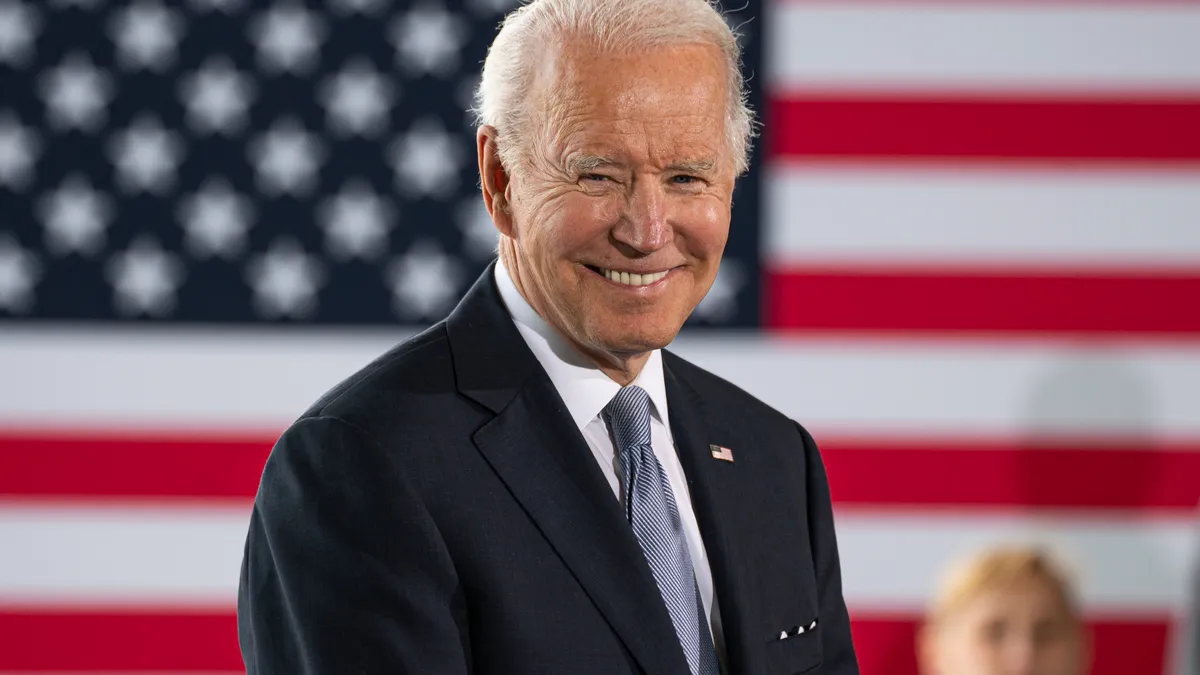Dive Brief:
- The U.S. Department of Education would receive $82 billion in discretionary funding under President Joe Biden's budget proposal for fiscal 2025, a 3.9% increase from fiscal 2023.
- The plan, released Monday, would also establish a federal-state partnership to make two years of community college tuition free, according to the Education Department. Additionally, the plan would subsidize two years of tuition for students from families who make less than $125,000 and who attend four-year historically Black colleges, minority-serving institutions or tribal colleges.
- It would also increase the maximum Pell Grant, from $7,395 to $8,145, and focus on funding efforts meant to reduce the cost of college and boost student success, including dual enrollment and open-source and free textbook programs.
Dive Insight:
Biden's proposal is essentially the Democratic president’s wish list — it’s unlikely to pass a deeply divided Congress. But it provides insight into his legislative priorities for higher education.
Through a federal-state partnership, his plan would make two years of community college free for first-time students and workers wanting to reskill, according to the Education Department. It would also allocate $12 billion to fund strategies to lower college costs, including by providing awards for institutions that “affordably deliver a quality education.”
Under the proposal, the maximum Pell Grant would increase to $8,145 for students attending nonprofit colleges.
For students at for-profit institutions, the maximum would rise to $7,495. The Biden administration said the budget proposal excludes for-profit institutions from the maximum increase due to evidence that they are the least likely to provide good student outcomes.
Jason Altmire, president and CEO of Career Education Colleges and Universities, which represents for-profit institutions, argued in a statement Monday that the proposal would penalize students attending proprietary institutions.
“Pell Grants are awarded to students based on their financial needs rather than the institutions in which they enroll,” Altmire said. “Underserved students deserve equal access to Pell Grants and should be able to utilize them at the institutions that align best with their personal circumstances and educational goals.”
Biden's proposal further includes a plan to double the Pell Grant’s maximum award amount by 2029.
Community colleges, HBCUs, MSIs and tribal colleges would receive a $93 million increase in funding intended to boost their institutional capacity.
Jon Fansmith, senior vice president for government relations and national engagement at the American Council on Education, said the president's proposal reflects his previously stated priorities, like increasing Pell Grants and making college more accessible to underrepresented students.
"This is a really astute understanding of where the best gains can be made in the higher education space," Fansmith said. "It may not necessarily be new, or may be variations on previous proposals, but it's the right place to keep putting emphasis."
While Biden's budget includes no bold new proposals on erasing student loan debt, it would drop one fee for borrowers.
Under the Higher Education Act, federal loans incur an origination fee of about 1% or 4%, depending on the type. The Education Department withholds that total from the money borrowers can access.
Biden's proposal would eliminate those fees, saving $2,800 for the average parent who borrows for their child’s college education, the White House said. Teachers and nurses with federal student loans would save an average of $1,000, it said.
The president's proposal would also invest nearly $2.7 billion in the Education Department's Office of Federal Student Aid, an increase of $625 million compared to fiscal 2023. The office's budget has been strained as it oversees the end of the federal student loan repayment pause and rolls out the new Free Application for Federal Student Aid.
"From day one, President Biden has fought tooth and nail to deliver the resources to our schools or colleges and universities," U.S. Secretary of Education Miguel Cardona told reporters during a press briefing on the budget. "We are focused on defending public education while some are hell bent on defunding."
However, Rep. Virginia Foxx, chair of the House Committee on Education and the Workforce, criticized the president's proposal as an overreach that lacks accountability to taxpayers.
"President Biden’s FY25 budget is not a fiscal panacea — it will make the nation keel over from shouldering more unsustainable and irresponsible debt," the North Carolina Republican said in a Monday statement. "We must chart a more fiscally judicious path than the one that the president intends to take this nation down."














